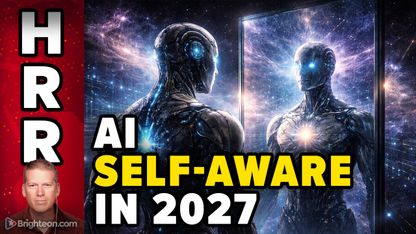
The International Olympic Committee (IOC) is preparing for artificial intelligence integration in the upcoming 2024 Paris Olympics.
Last year, French legislation authorized the use of AI video surveillance for a trial period covering the Olympic Games to detect abnormal events or human behavior that could pose potential threats. The AI surveillance technology employs sophisticated algorithms to analyze real-time video streams from existing surveillance systems.
These algorithms are trained to detect predefined "events" and abnormal behavior, such as crowd surges, abandoned objects or the presence of weapons. The surveillance will send alerts accordingly and let human beings decide if the alert needs immediate attention. (Related: Dallas school district installs AI spying, surveillance systems to keep an eye on students.)
As part of the preparation, the IOC, in collaboration with law enforcement agencies and major transportation companies, tested the AI-surveillance technologies by using them at French league football games in Paris and a concert by the American hip-hop group the Black Eyed Peas.
The surveillance systems analyzed images from a network of 100 cameras, detecting anomalies in crowd surges, abandoned objects and potential security threats like the presence of weapons.
Moreover, the IOC claims that using AI in sports could help identify talented athletes, personalize training methods and improve judging for fairer competitions. The IOC also plans to integrate AI to protect athletes from online harassment and enhance the broadest experience as the Paris Olympics looms.
"Today we are making another step to ensure the uniqueness of the Olympic Games and the relevance of sport. To do this, we have to be leaders of change. We are determined to exploit the vast potential of AI in a responsible way," said IOC President Thomas Bach in a press conference at the Olympic Park in London, which hosted the Summer Games in 2012.
Officials also claim that AI integration could play a crucial role in preventing incidents similar to the bombings during the 1996 Olympics in Atlanta or the tragic Nice truck attack in 2016.
Digital rights activists and organizations oppose AI-driven surveillance integration in Olympics
But no matter how promising and successful the preparations are, AI-driven video surveillance integration still raises privacy concerns.
Digital rights activist Noemie Levain said "convenience" is just part of the narrative developers use to sell their products. Levain argued that the preference for French companies in awarding Olympic contracts is almost a foregone conclusion. She also cast doubt on the notion that security concerns are the primary driver behind the adoption of these AI technologies.
"They say it makes all the difference that here there will be no facial recognition. We say it is essentially the same. AI video monitoring is a surveillance tool that allows the state to analyze our bodies, our behavior, and decide whether it is normal or suspicious. Even without facial recognition, it enables mass control. We see it as just as scary as what is happening in China. It's the same principle of losing the right to be anonymous, the right to act how we want to act in public, the right not to be watched," Levain said.
Visit PrivacyWatch.news to read more stories like this.
Watch a discussion on how real-time data can be collected during a biometric data security scan.
This video is from the Ace of Coins channel on Brighteon.com.
More related stories:
Biometric data and surveillance: DNA being eyed as the "ultimate global ID."
JPMorgan to launch biometric payment system as next step in Orwellian financial surveillance.
AI allowing globalists to construct worldwide surveillance PRISON from which there is no escape.
Major retailers cite RETAIL THEFT as justification for using AI-powered surveillance in stores.
Sources include:
Please contact us for more information.

















